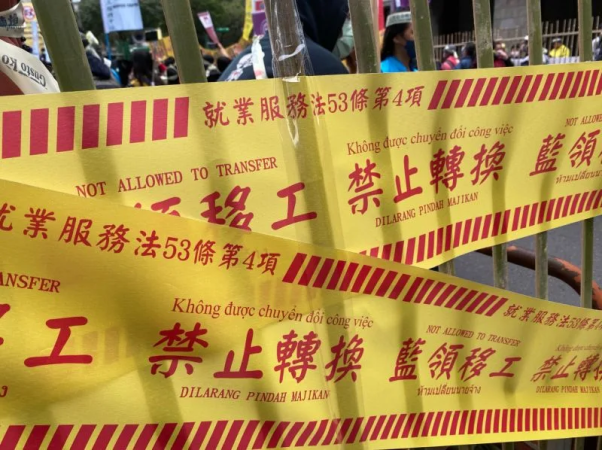
Foreign caregivers, often working in isolated environments within employers' homes, face a higher risk of harassment and assault due to a lack of privacy. Experts analyzing the MeToo incidents involving foreign caregivers highlight concerns such as the inability to change employers freely and lengthy legal processes, making it challenging for migrant workers to defend their rights.
The secretary-general of the Domestic Caretaker Union, Huang Zihua, pointed out that regulations do not allow migrant workers to change employers freely. This means they cannot switch or leave a situation just because they "feel strange or uncomfortable." Therefore, when migrant workers face harassment or uncomfortable sexual hints, they typically seek assistance from intermediaries first, who then help with the subsequent transition process.
Moreover, since many domestic caregivers rely on private intermediaries to find employers, and the job market is mostly controlled by private intermediaries, these intermediaries become the primary source of information for caregivers and the first point of contact for assistance. The inability to change employers freely reinforces the reliance of migrant workers on intermediaries. Consequently, when migrant workers encounter problems, their first choice is usually to approach intermediaries rather than seeking help from government relief channels.
Chen Hsiu-lien, a researcher at the Taiwan International Workers Association (TIWA), pointed out that when intermediaries receive cries for help from caregivers, they usually ask the workers to endure the situation. If a more severe incident occurs, the intermediary may then help the worker leave. Since intermediaries hope to continue earning placement fees from the original employer for new workers, they avoid confrontation and maintain their relationship with the employer. Most of the time, intermediaries adopt an attitude of "minimizing big issues and dismissing small ones," discouraging workers from filing gender equality complaints. They might even warn workers that "new employers won't like someone with a criminal record," dissuading them from filing complaints or lawsuits.
Huang Zihua observes that the most common situation is that migrant workers, facing accommodation and livelihood problems due to unemployment, often succumb to the pressure of lengthy gender equality complaints. This leads them to agree with intermediaries or employers not to file or withdraw complaints in exchange for changing employers. Because they cannot freely switch employers, many foreign caregivers compromise to leave dangerous environments or reduce unemployment gaps, becoming undocumented cases in the relevant statistics.
The entire hiring and intermediary system, coupled with the inability to freely switch employers, puts caregivers in a unique predicament. Huang Zihua believes that actively assisting migrant workers facing harassment is not the responsibility of intermediaries but a result of the government, through the intermediary system, shirking the responsibilities it should bear.
Whether or not there is support from social welfare agencies, foreign caregivers face particular frustration when dealing with lengthy and complicated gender equality complaints or legal procedures.
Jasmin, a Filipino caregiver, shares a case where a fellow caregiver experienced harassment from an intermediary. Initially unwilling to settle, during the legal proceedings, she felt that each court session resembled bargaining for the amount of settlement. Moreover, after finding a new job, she had to take leave for every hearing, essentially using up all her days off during weekdays. After enduring this for over six months, she couldn't bear it any longer and reluctantly accepted a settlement of NT$120,000.
"For her situation, this is a very, very small amount. I don't think she wanted the money. I can feel it, I can understand. It's because of the (torturous) legal process," says Jasmin. Instead of spending vacation time attending court hearings, workers would rather give up legal proceedings to regain the freedom to take time off. This illustrates the challenging situation faced by migrant workers in Taiwan when dealing with sexual harassment or assault incidents.
Chen Hsiu-lien mentioned that over the past decade, there have been notable improvements. If a migrant worker calls the 1955 labor consultation and complaint hotline for help, the Labor Bureau typically promptly contacts the nearby police station. They then immediately remove the individual from the scene, adopting a method of prioritizing temporary placement before conducting investigations.
Serve the People Association founder Du Guang-yu observed that not all counties and cities uniformly and efficiently implement these measures. For instance, last year, the Control Yuan corrected the Kinmen County government. In a case where a foreign domestic caregiver faced harassment and called the "1955 hotline," the local government failed to promptly contact the migrant worker, neglecting issues like the worker reluctantly agreeing to not file a complaint and changing employers due to mental and physical stress. Du Guang-yu believes that the Kinmen County government overlooked the rights of migrant workers, indicating a clear neglect.
Cases of sexual assault or harassment are inherently challenging to prosecute due to difficulties in collecting evidence. From fundamental issues in employment to subsequent rescue processes, systemic deficiencies have persisted without improvement. Chen Hsiu-lien grades the government's actions as barely passing, scoring between 60 and 65 out of 100.
Chen Hsiu-lien believes that the government can do more, such as providing more comprehensive rights education and actively setting up booths in places where migrant workers gather for consultations. These "not difficult" actions have not been taken. NGO groups urge the government to take more proactive measures and establish comprehensive relief channels for these foreign workers in Taiwan, ensuring they don't have to silently cry in the shadows.
〔NOWnews / Feature report from Gan Tingjia (甘庭嘉) 〕
2023-10-07 11:52 〔photo from NOWnews〕
